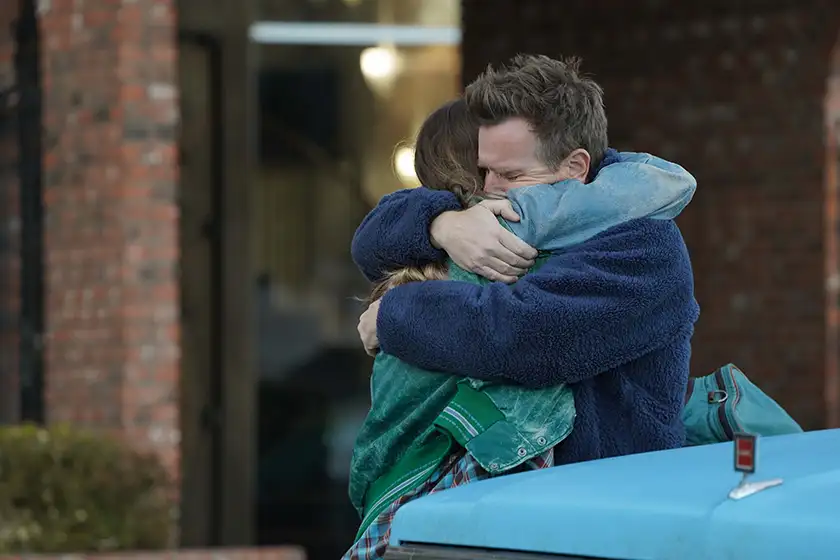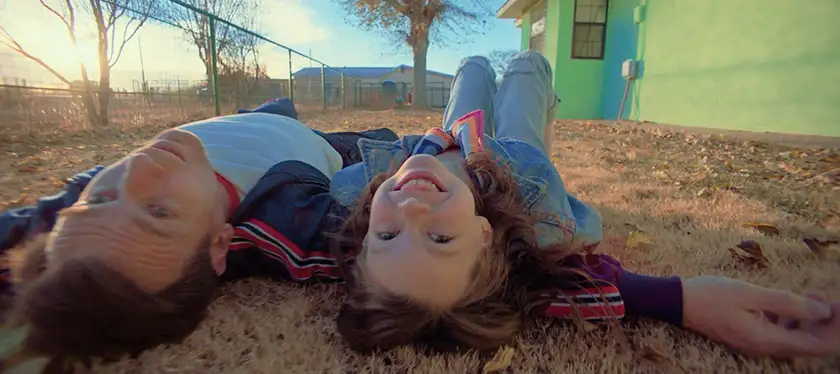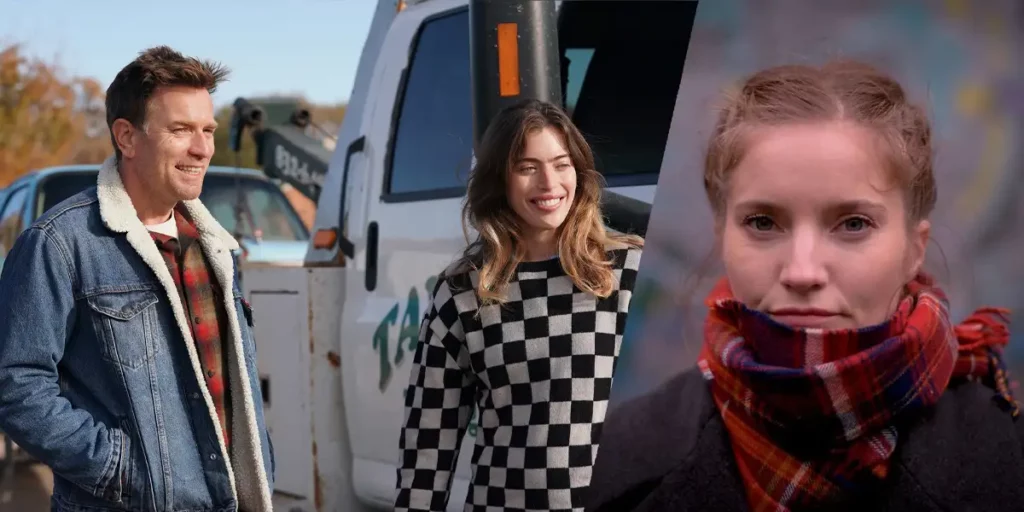Ahead of the release of Bleeding Love, we sat down for an interview with director Emma Westenberg to discuss its cast, themes and her filmmaking style.
Emma Westenberg’s Bleeding Love – stemming from a story by Ruby Caster, Vera Bulder and one of the film’s stars, Clara McGregor – is a quirky addiction drama centred around a young woman (McGregor) who, after an accidental overdose, is on a road trip with her estranged father (Ewan McGregor, Clara’s real-life dad).
She believes they’re headed to the house of an artist in San Fransisco, and this is a misguided attempt at bonding after a period of estrangement. But, secretly, her father is driving her to rehab, all too aware of the powers of addiction after struggling with his own alcoholism. Their journey is sometimes fraught, sometimes sweet, and they meet a host of strange and interesting characters along the way. But as well as learning to heal the rifts between them as father and daughter, it is also a trip for them to heal within themselves.
After the film premiered at SXSW and the Glasgow Film Festival, we spoke to director Emma Westenberg ahead of Bleeding Love’s general release about working with Clara and Ewan, as well as the film’s themes and style.
Emma Westenberg’s approach to Bleeding Love and working with Ewan McGregor
Emma, congratulations on the film, first of all. What has the release experience for Bleeding Love been like so far?
Emma Westenberg: It’s definitely been very exciting and very nerve racking. It’s such a big thing to make a movie, but to also make it with Ewan McGregor means there are many eyes on it, which is really exciting but also very, very nerve wracking.
Both Ewan and Clara McGregor were already attached to the project when you signed on. Was that intimidating?
E.W.: Yeah, definitely. When I read the script, I knew that they were attached and it was already at [production company] Killer Films, so an opportunity to work with them was just so exciting. And then I read the script and pitched on it, and they decided to go with my take.
What is it like working with someone as ‘movie-star’ famous as Ewan Macgregor?
E.W.: He is so nice. I have only good words to say about him. He’s really kind, really patient, and makes everybody on set feel at ease. He’s also just a great actor, and to see him in every take is just incredible. No wonder he’s a superstar.
And with this film there’s the overlap of Ewan-the-actor and Ewan-the-father too, in a way.
E.W.: Yeah. Of course, I’m not part of their dynamic, but it seemed really nice, the way that they were able to do that and spend so much time together on set. I think they definitely enjoyed that part of it as well.

Is there a significance to the song ‘Bleeding Love’ and why it was chosen?
E.W.: We didn’t know we were going to use this song until we were on set. We were looking for a song that would fit the scene perfectly, something that they could really sing along to and is a fun power ballad that, at the same time, makes sense within the scene. So we were going back and forth with different songs and we didn’t find one that particularly clicked until Clara mentioned how Ewan would pick her up when she was in high school and he loved this song. He would blast it and sing along and she would be so embarrassed of him. And so we thought ‘oh, actually, this song is perfect’, because it has so much power, is really fun, and also because it was really real to them.
Bleeding Love’s familial relationships
The placement of the scene in which they sing that song is interesting, because it comes in the middle of the film, when their relationship is still raw, and it’s a relationship that ebbs and flows constantly. Is that something you enjoy as a filmmaker?
Emma Westenberg: I definitely liked the element of surprise. What I was really looking for in the characters is that constant push and pull between the two, because recovery and the rekindling of a relationship has a lot of back and forth. It’s never just every time being a little bit better, it’s uneasy and you don’t know when it’s going to be good or when it’s going to be bad. So the pushing and pulling, and them one upping each other with jokes, was very much the part of their dynamic that we could build the story around. And especially with a parent, you can very easily slip back into being close, but at the same time it’s kind of awkward when you’re an adult. It’s a very specific type of relationship.
That familial connection between Ewan and Clara brings something quite unique to the film. Did that impact your experience in terms of directing them?
E.W.: At first, you don’t know how it’s going to be, because while of course they’re father and daughter, I didn’t know how far into their relationship they would allow me. But both of them are such professionals. They come on set as actors and are very prepared, but when we would do improv or in between scenes, we would get little bits and pieces where they could really just build upon their lifelong bond, and that was really special to see and experience.
While not autobiographical, the film feels very personal. Was that daunting at all?
E.W.: The movie is totally fictional, but they are father and daughter and they have their own history and coming into the movie I knew it was definitely something that could go so many different ways. But they were really open in every scene, discussing how it felt to them and how it related to them. I would also share my personal experiences with my own family and my own destructive patterns, and so would our cinematographer [Christopher Ripley] and production designer [Stephonik]. In creating the movie and creating its visual language, story and characters, we had a lot of conversation amongst the cast and crew to find the universal truths in it. So while it’s not necessarily about them, it’s a very personal story to all of us.
How Emma Westenberg developed the themes in Bleeding Love
Is that something that’s important to you as a filmmaker, finding that universal truth?
Emma Westenberg: The first things I ask are: can I relate to the story, and can I emotionally understand it? And then, I like to look for what it is in the story that speaks to human nature – something that we can all relate to – but that I can tell in a very specific way with specific characters. I definitely do look for something that is not only relevant for me, but relevant for other people, too. I look for the essence of the story.
That’s the beauty of film, right?
E.W.: I totally agree. That is just the power of storytelling: you can empathise and completely live through somebody else’s experience.
These are both incredibly flawed characters, but that’s what makes human beings so interesting. Was that always present in the script, or was it something developed naturally?
E.W.: It was definitely present in the script, but we also developed it further. As a filmmaker, I very much aspire to make character driven movies, because those are the movies that I find most compelling. Real people do have their shadow sides and their weaknesses, but it’s also what makes them interesting. I always try to make every character really well rounded and really look for where the tension is between them. So that’s why, in the beginning of the film, we decided to make the daughter make jokes all the time and the father try to sincerely connect, and then turn it around.
Both characters experience either side of the addiction experience. Was that also something that drew you to the film?
E.W.: I definitely wanted to tell a story about substance abuse that wasn’t just showing how dark or how hard it is, but showing the humour in it. I wanted to tell a hopeful story, because in reality really sad situations are oftentimes also quite funny and there’s humour in the most unexpected places. I think that also makes it really real. I definitely wanted to tell a story where you get a well-rounded portrait of substance abuse and show the different tones – the darkness next to the light.
One moment of humour that really got me was the voice-to-text scene. [In which Ewan’s character struggles to use the feature on his phone as a result of his natural Scottish accent, resorting to putting on an American one to be understood.] As a fellow Scot, I completely empathised with Ewan there.
E.W.: That was actually improv!
Even better. And in regards to that shifting tone, it’s a film that has evoked different reactions in its audiences. Our reviewer found it quite frightening, whereas I found it quite hopeful. Was that ambiguity intentional?
E.W.: Both of those things are definitely present in how I saw the story and how we were developing it. That’s the thing we wanted to show with the father and when he gets the shot glass. For him, addiction is always present and is something that will never totally go away. So the tension and anxiety around it were very much part of the narrative [from the beginning]. But again, that’s not the only thing that exists in life. Life has so many different tones and faces, and I wanted to have space for both in the story to make it feel realistic.
Emma Westenberg’s directorial style and the energy of Bleeding Love
There’s an almost frenetic energy and quirkiness to the film. Is that style of filmmaking something you gravitate towards, or did it occur naturally throughout the process?
Emma Westenberg: Well, I definitely like a playful tone. I think even if the movie is a story about a father and a daughter that’s quite intimate, and a drama, I really liked having this playful tone because I think that that’s also my lens. I see a lot of humour in daily life, even when things get harder, so I think especially in movies, I want to entertain the viewer, and I want to bring them into a world which is colourful and playful and ease them into the story. And the use of colour and composition is a big element as I come from an art background, so I like to use the visual aspect as a visual language to tell the story of the characters. I would say yes, it’s definitely my style.

With the film’s general release this week, do you like watching your movies back with an audience?
E.W.: I’ve seen it now a couple of times at festivals, and every time I get so nervous. At some point you don’t see it anymore like a first time viewer sees it, so it’s hard to tell the reaction. I only see everything I would do differently next time.
What is next for you as a filmmaker?
I’ve been working on multiple scripts. This movie, of course, is an intimate drama but for my next movie I would really like to do a genre piece. I’m working on a musical movie set in Amsterdam, but also on a horror movie. So I’m just working on different scripts, developing some with screenwriters and some I’m writing myself, and just trying to get a new movie off the ground as soon as I can. But definitely a genre piece is something I’m interested, a musical with a lot of colour and costumes, that’s what I want to do.
Thanks so much for speaking with us, and all the best with the film’s release.
E.W.: Thank you as well for your time and watching the movie.
This interview has been edited for length and clarity.
Bleeding Love will be released in UK & Irish cinemas from 12 April, 2024. The film is out now on digital and on demand in the US and more countries. Read our review of Bleeding Love!

